Summer is upon us, and that calls for books to enjoy while lounging poolside. We asked MIND colleagues to recommend their favorite mathematically themed reads, and their picks run the gamut of genres from sci-fi to psychology, and of course, books ideal for equitable math education and professional development.
Add a few of these to your summer reading list for completely guilt-free and possibly enlightening pleasure.
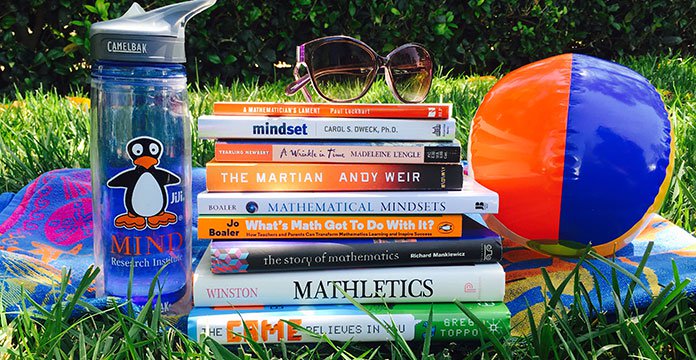
Power in Numbers: The Rebel Women of Mathematics is a visually captivating collection of stories highlighting the contributions of female mathematicians over the last two millennia.
You'll see famous mathematicians come to life on each page, women like astronomer-philosopher Hypatia, theoretical physicist Emmy Noether, and rocket scientist Annie Easley.
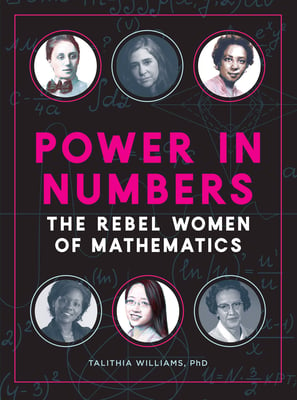
The jobs of the future are in STEM and will require students to have a strong foundational understanding of mathematics. Our inadequacies to mathematically educate most students, and students of color, in particular, is harmful to students and our society.
In Choosing to See, Pamela Seda and Kyndall Brown offer a substantive, rigorous, and necessary set of interventions to move mathematics education toward greater equity. Particularly, in serving the needs of Black and Brown students, who are underrepresented and underserved as math scholars.
Composed as a letter to fellow educators, Dear Citizen Math offers an inspiring new vision for math class: as a forum for discussing the most important and interesting issues in society. Topics include healthcare reform to global pandemics, fake discounts to the acceleration of technology, and more.
For generations, students have viewed mathematics as a set of random skills to memorize concepts with little connection to reality. But math is a powerful prism for exploring and making sense of the world, and math teachers can be the most influential people in American democracy. They have the potential to kindle a newfound commitment to reason and cultivate a more thoughtful citizenry.
Participating in math class feels socially risky to students. Staying silent often feels safer. In Motivated, Ilana Seidel Horn shows why certain teaching strategies create classroom climates where students want to join in.
She introduces six different math teachers, in a range of school settings, who found that motivation requires more than an interesting problem. You'll find suggestions for identifying what impedes each factor, along with strategies for weaving them into your instruction. You'll also be introduced to an online community who support each other's efforts to teach this way.
Math has a bad rap. Many adults hate math and will work to avoid it at all costs. It shouldn’t be too difficult to remember that thinking, talking and any sense of reality were not a part of most math classes. Even after years of effort, our students continue to perform poorly compared to other countries.
But, what if our very definition of math is inaccurate? And what if math isn’t a gift that only a few have? Can math be engaging, fun and accessible to all students?
Jo Boaler states, “This book is all about giving teachers, parents, and others the knowledge of good ways to work in schools and homes, so that we can start improving our children’s and our country’s futures.”
We need more mathematical people. This book sets a clear path for making that happen.

If you’ve seen the 2011 movie Moneyball then you know how exciting and powerful it is to understand the statistics that drive success in sports. Mathletics captures that excitement by describing the performance of thousands of famous players with easy-to-understand statistical analyses, showing how games were decided and contracts renewed.
Just by following the book’s many tables, illustrations and simple computations, your enjoyment of professional sports will be intensified, and your expertise deepened. Even your fellow sport fanatics will be impressed by the Vin Scullyesque commentary that you’re likely to develop at game time. As each chapter answers some of the most perplexing questions and strategic choices that face managers, recruiters and oddsmakers, perhaps you’ll wonder why this subject wasn’t taught in high school, and how you could have ever played fantasy football without this book.

In this brief volume, Lockhart, a Michelangelo of mathematicians, passionately paints a vision of all that math education could be. As one who has seen a wonderful mathematical world that others ignore or are blind to, Lockhart grieves over the "soul crushing" machine of endless formulas, procedures and rote memorization.
However, rather than dwelling in despair, he proceeds to reveal an inspiring picture of mathematics as an artistic pursuit of deeply creative human beings. It is a fascinating, thought-provoking weekend read that will challenge the way you look at mathematics, propelling you on your own quest for mathematical beauty.

Instilling a growth mindset is only one piece of the puzzle to inspire students to pursue and succeed in mathematics. The perception of mathematics itself needs a makeover. Boaler warns educators that commonly-held views of mathematics being about speed and memory is at odds with the beauty of mathematics inherent in its exploratory nature of finding patterns and making connections.
This book contains concrete examples of activities that promote mathematical mindsets alongside narratives of the problem-solving behaviors that emerged and ways those behaviors reflected growth mindsets.
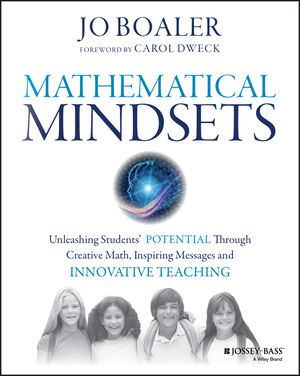
Not just for math educators, Denis Sheeran's book reads like a series of blog posts or letters written directly to the educator. Each vignette is a story of an event that inspired Sheeran to bring, change or go off course from a lesson in his classroom.
In school, so many of us believe our students should solve problems as quickly as possible by following a single, time-tested path. Although this path may lead to a successful solution, all too often, it doesn't help the students move on to the next round of learning.
-Denis Sheeran, Instance Relevance
Sheeran brings a healthy reminder and practical ways to get started making those connections from real life problems to bring them into the classroom. He reminds educators that when we keep an open mind about the possibilities of the questions and problems around us, we invite students to engage with the world mathematically.
Aspiring renaissance men and women should seek out and embrace this multi-faceted and culturally rich book; upon its rather modestly-sized pages are profiled the many famous mathematicians who developed the methods of reasoning that cumulatively enrich our daily lives.
Designed like a mini-coffee table book, and abundantly equipped with artistic illustrations, it deceptively possesses mathematical depth and integrity. By the time you reach page 114, you nod your head appreciatively at the idea that a set of beautiful mathematical instruments graced the table of a wealthy Italian as a status symbol in the early 1700s, and by the end of the book you are fully invested in the value of the complex mathematical analyses that today drive the way science and technology are pursued and interpreted by practitioners and philosophers alike. It is entirely possible that this one book will prompt you to buy another mathematics book, and another, and another...
While not specifically about math, this classic will spark any child or adult's interest in STEM fields (science, technology, engineering and math), and space travel in particular. Thinking how long it will take us to reach the nearest potentially habitable planet using existing technology (what – 17,000 years!?)-- there must be a better way.
So, this is the way! In addition to being great science fiction, this is an excellent story of good versus evil, overcoming fear of the unknown and misunderstood, and how you can make a difference.
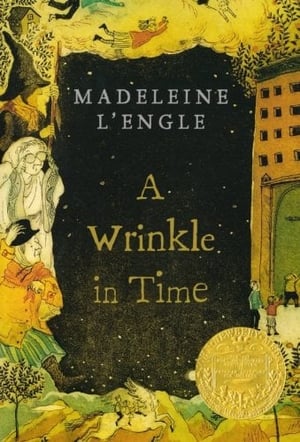
Mark Watney is living an astronaut’s worst nightmare: being stranded on Mars. Despite having very limited supplies, Mark uses his math and science knowledge as well as problem-solving skills to plan out how to survive the next four years and get to the landing site of the next mission.
The character’s humor, persistence and critical thinking skills draw you into his world and make the math and science accessible.
Toppo, a former teacher and USA Today reporter best known for his investigations of national cheating scandals, is ununapologetically optimistic about the promise of educational games to holds to transform students, teachers and schools.
Toppo introduces readers to the pioneering practitioners and researchers in the field of game-based learning, and explores how schools are using game-based learning across all subjects, including math. Interspersed throughout are his personal experiences playing a few compulsively enjoyable educational games. Just be warned: before you finish the book, you'll probably also be downloading a few new games to try out.

Farber, an assistant professor, has made a deep dive study into a group of innovative educators incorporating game-based learning in their classrooms. These educators not only strive to engage their students in deeper learning through games, but have formed a community of like-minded educators, sharing insights, best practices, and failures. Farber tells the story of "The Tribe" of educators, as well as sharing teaching strategies, game analysis and data results.
It amazes me that people who are so invested in education, and the health and welfare of children, don't understand the power that a well-designed game—under the tutelage of a caring and knowledgeable teacher—can have on children. It can be immense. It can change everything.
- Peggy Sheehy, quoted in Game-based Learning in Action
This is a must read for parents, teachers, coaches, or anyone who mentors or manages people. Is ability fixed or a changeable quality that can be developed? Why is it harmful to tell your children they are smart or talented?
Based on decades of research, Dr. Carol Dweck shares the power of our mindset that permeates every part of our lives. This book is easy to read, but with the power to change your life and the lives of those around you.
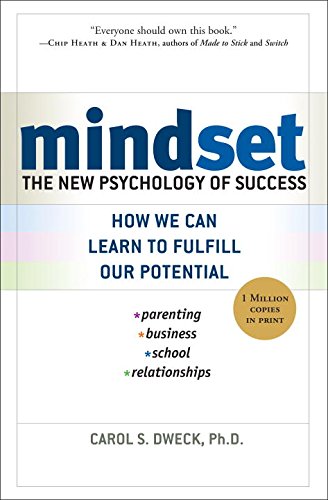
Links direct you to the book on Amazon Smile, where you can support a charity of your choosing (including MIND Education!) when you purchase.
Let us know what you think of the above, or tell us what you're reading this summer by tweeting to @MIND_Research.
This blog post was originally published on June 28, 2018, and has been updated.

Calli Wright was the Marketing Manager at MIND Research Institute. She loves playing and designing board games, which she often talks about on twitter @CalliWrights.
Comment